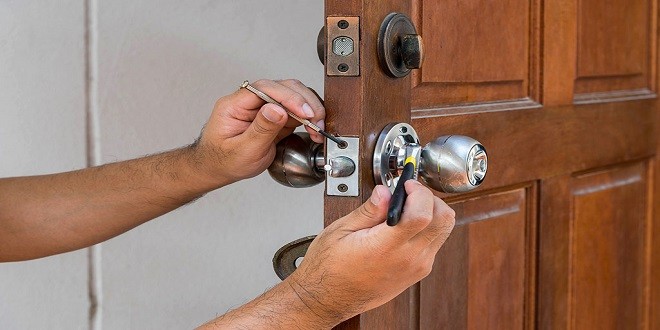Whether it’s the scorching summer heat or the biting winter cold in Smithville, your locks endure a lot. As a residential locksmith in Smithville, we’ve seen how weather can play havoc with home security. It’s not just about the inconvenience of a key that won’t turn smoothly. Extreme weather conditions can cause lasting damage to your locks, leaving your home vulnerable. But fear not! There are effective strategies to weatherproof your locks, ensuring they remain functional and secure year-round.
The key to safeguarding your home starts right at your front door. From the sturdy safety lock for the front door to the sleek sliding patio door lock, each type of lock has its own vulnerability to weather. Think about it: your sliding glass door lock may face different challenges compared to a traditional bolt lock for the front door. In Smithville, where the weather can be unpredictable, it’s crucial to understand these differences. By learning how to protect your locks from the elements, you not only enhance your home’s security but also extend the life of these essential devices. In the next sections, we’ll dive into specific tips and tricks for maintaining various types of locks, from the front door double lock set to the window security lock, keeping them in top shape no matter the weather.
Combatting Climate: Advanced Weatherproofing Techniques for Home Security
When it comes to safeguarding your home against the unpredictable whims of weather, advanced weatherproofing techniques for your locks and doors are not just a luxury; they’re a necessity. Smithville’s climate, with its humid summers and frosty winters, can be particularly harsh on door locks. As a seasoned residential locksmith services in Smithville, I’ve witnessed numerous instances where a little weatherproofing could have saved homeowners a lot of hassle and expense.
Firstly, let’s talk about moisture, the enemy of metal. Rain, snow, and even high humidity can lead to rust and corrosion in your locks. This is where a high-quality lubricant comes into play. A silicone-based lubricant or graphite powder can be a lifesaver for your locks. These substances repel water and prevent the internal mechanisms from sticking or rusting. It’s a simple step: just apply the lubricant to the keyhole and the moving parts of the lock. Remember, regular maintenance is key to long-term protection.
But moisture isn’t the only concern. The intense UV rays during Smithville’s summers can also damage your locks, especially if you have electronic or smart locks. UV rays can degrade plastic components and affect electronic circuits. To combat this, consider installing a small awning or protective cover over the lock. This not only shields the lock from direct sunlight but also minimizes exposure to rain and snow.
For those living near the coast or in particularly windy areas, sand and fine particles can be problematic. They can get into the tiny crevices of your locks and cause wear and tear. In such cases, a regular cleaning schedule is crucial. Use a can of compressed air to blow out any debris from your lock mechanism. This is particularly important for sliding door locks, patio door locks, and window locks, which are more exposed to these elements.
In colder months, a common issue is the freezing of locks. This can be a real hassle, especially when you’re locked out in the cold. To prevent this, use a lock de-icer or a glycerine-based lubricant. These products not only melt the ice but also provide a protective layer to prevent water from seeping into the lock mechanism and freezing.
Lastly, let’s not forget about the mechanical wear and tear. Regularly check your locks for any signs of wear. Look out for loose components, especially in high-usage areas like your front door safety lock or sliding patio door lock. If you notice any issues, it’s best to call in a residential locksmith for a professional assessment. A small fix now can prevent a major problem later.
Remember, your home’s security starts with the locks. By implementing these weatherproofing techniques, you’re not just protecting your locks; you’re ensuring the safety and security of your home and loved ones.
The Impact of Seasonal Changes on Home Locks: Smithville Locksmith’s Advice
Living in Smithville means experiencing a kaleidoscope of seasons, each bringing its own unique impact on your home. As a seasoned residential locksmith in Smithville, I’ve seen how the changing seasons can play a significant role in the performance and lifespan of locks. Understanding these impacts is crucial for maintaining both the functionality and security of your home.
Spring and summer in Smithville often bring high humidity and heat. This can cause metal components within locks, particularly sliding patio door locks and window security locks, to expand. When metal expands, it can make locks stiff and difficult to operate. On the other hand, high humidity can introduce moisture into your lock mechanisms, leading to rust and corrosion over time. This is especially relevant for outdoor locks like patio door locks and window locks. To counteract these effects, it’s advisable to regularly clean and lubricate your locks with a non-greasy product like graphite powder, ensuring they operate smoothly.
Fall and winter, however, present a different set of challenges. The cold can cause metal to contract, leading to misalignment in lock mechanisms. This is a common issue with residential door locks, including front door double lock sets and bolt locks for front doors. The colder months also bring the risk of locks freezing, which is particularly troublesome for early morning departures or late-night returns. A good practice is to have a de-icing solution handy or to use a lock lubricant that also acts as an anti-freezing agent.
Another often-overlooked aspect is the impact of seasonal debris. Autumn leaves, winter snow, and spring pollen can all find their way into your locks, especially in less protected areas like sliding glass door locks and wood sliding door locks. Regularly cleaning your locks with a mild, non-corrosive cleaner and a soft cloth can prevent buildup and ensure the longevity of your locks.
The changing seasons also mean fluctuating usage patterns for certain locks. For instance, during the summer, sliding door locks and window locks are used more frequently, leading to quicker wear and tear. Conversely, in winter, when windows are seldom opened, the locks can become stiff due to underuse. Regular check-ups and maintenance of these locks are essential.
As a residential locksmith in Smithville, my advice is to stay proactive with your lock maintenance. Each season, take time to inspect, clean, and lubricate your locks. If you’re unsure about the condition of your locks or need help with maintenance, a professional locksmith service in Smithville can provide the expertise and peace of mind you need. Remember, the key to ensuring the longevity and effectiveness of your locks lies in understanding and adapting to the seasonal changes unique to our region.
Proactive Maintenance: Seasonal Strategies for Long-Lasting Lock Durability
In Smithville, where the weather swings from the heat of summer to the chill of winter, proactive maintenance of your home locks is not just a recommendation; it’s essential. As a residential locksmith in Smithville, I can’t stress enough the importance of seasonal strategies to ensure the durability and effectiveness of your locks. By adopting a proactive approach, you can prevent common problems and extend the life of your locks, whether it’s your front door safety lock, sliding window lock, or patio door locks.
Spring Cleaning for Locks: With the arrival of spring, it’s time to clean and inspect all your locks. This includes dislodging any debris that might have accumulated over the winter. A can of compressed air works wonders for blowing out dust and particles from the intricate parts of locks, especially for sliding door locks and window locks. Also, check for any signs of rust or corrosion, particularly on outdoor locks like your sliding patio door lock or window security lock. If you find rust, lightly sand the area and apply a rust inhibitor. Finish off by applying a lubricant to ensure smooth operation.
Summer Sun Protection: In the heat of summer, locks, especially those on exterior doors like your store front door lock or sliding glass door lock, are exposed to intense sunlight. UV rays can not only fade but also weaken certain materials over time. Consider installing a small shade or awning over locks exposed to direct sunlight. This simple step can significantly reduce heat-related wear and tear.
Autumn Adjustments: As leaves fall and temperatures start to drop, it’s an excellent time to check the alignment of your locks and doors. The changing temperatures can cause materials to expand and contract, leading to misalignment. This is particularly crucial for double front door locks and sliding door locks, where alignment is key for proper functioning. Adjust and tighten any loose components to ensure everything is in proper working order.
Winterizing Your Locks: Before the frost sets in, prepare your locks for the cold. Use a lubricant that provides a protective layer against moisture to prevent freezing, which is crucial for your front door chain lock and bolt lock. If you have electronic locks, like a fingerprint front door lock, ensure they are well protected from the elements, as extreme cold can impact their functioning.
Regular maintenance should not be overlooked. This includes simple tasks like checking the tightness of screws and ensuring your door lockout kit is in good working order. For more advanced issues, such as a window lock replacement or installing a child lock for the front door, don’t hesitate to seek professional help.
By following these seasonal strategies, you’re not just maintaining your locks; you’re actively protecting the safety and security of your home. Regular, proactive maintenance ensures that your locks remain reliable, durable, and effective, no matter what the Smithville weather throws at them.
Conclusion
As we’ve navigated through the seasons and their effects on your home security, it’s clear that proactive maintenance and understanding the nuances of weatherproofing are key to ensuring the longevity and effectiveness of your locks. In Smithville, where each season brings its own unique challenges, staying ahead of the game in terms of lock care is crucial. But let’s face it: sometimes, despite our best efforts, locks fail or need professional attention. This is where Quickey Locksmith steps in.
Our team of expert residential locksmiths in Smithville is dedicated to providing top-notch service, whether it’s a routine check-up, emergency lockout service, or upgrading your home security. We understand the local climate and its impacts on locks and are equipped to offer solutions tailored to your needs. Remember, your home’s security is paramount, and at Quickey Locksmith, we’re committed to ensuring that your locks are always up to the task, come rain, shine, or snow.
Frequently Asked Questions
What can I do to prevent my door locks from freezing in the winter?
To prevent freezing, use a lubricant that offers a protective layer against moisture. Applying it before the onset of winter can help keep your locks from freezing. Also, consider using a lock de-icer as a quick fix for frozen locks.
How often should I lubricate my locks?
Ideally, lubricate your locks at least twice a year, preferably during the spring and fall. Regular lubrication helps maintain smooth operation and prevents rust and corrosion.
Can UV rays really damage my locks?
Yes, prolonged exposure to UV rays can degrade the materials in your locks, especially in electronic or smart locks. Installing a protective cover or shade can help mitigate this damage.
Is it necessary to clean the locks regularly?
Regular cleaning is important, especially for outdoor locks. Remove debris and dust from your locks with a soft cloth or compressed air to prevent buildup and ensure their proper functioning.
What should I do if my lock becomes stiff and difficult to turn?
If a lock becomes stiff, first try cleaning and lubricating it. If the problem persists, it might be an alignment issue or internal damage, and you should consult a professional locksmith.
 Naa Songs
Naa Songs



